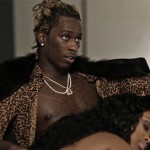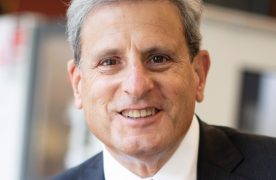
From Donald Trump Jr.’s controversial Skittles tweet to “Yaaas Hillary” T-shirts and everything in between, the media and American politics have had, and continue to have, an interesting relationship.
Playwright Jamie Pachino highlights this in her play “The Return to Morality,” which arrived in Boston this September. It throws in a comedic twist on the way the public perceives the power of speech and the media when it comes to politics. Though not necessarily a light-hearted topic, “The Return to Morality” does its best to tell the story of the failures of a college professor “caught in the maelstrom of his own good intentions,” according to the play’s page on the Playscripts website.
Although the play was written over 15 years ago, Titanic Theatre Company thought the theme was “very topical,” said Michael Ricca, one of the founders of Titanic Theatre Company.
The play itself heavily deals with the media and its influence in American politics.
“The media has always influenced politics — whether you go back to flyers, way back in the 19th century, and then radio, and then, most importantly, television and now digital and social media,” said Tobe Berkovitz, an advertising professor at Boston University. “This has been a way that politicians communicate with the voters and also a way that voters can have some input … it’s very much an interactive relationship between both the politicians and the media and the voters.”
With the 2016 presidential election campaign entering its final stretch, Ricca said he found that “The Return to Morality” highlighted the power and influence that American media has on politics. One thing that has helped Republican presidential nominee Donald Trump gain notoriety is the media attention, Ricca said.
Berkovitz, however, has mixed views.
“The formal mainstream media has no influence on this election or else Donald Trump would not be the Republican nominee, because the mainstream media uniformly was opposed to the Trump candidacy,” Berkovitz said. “Social media and digital media have contributed to the Donald Trump candidacy because Trump is very, very effective in using Twitter — and cable and broadcast media as well.”
While the media can be extremely influential, many people also distrust it because of how sensationalized it has become.
“Its primary goal should be to inform the voters,” Berkovitz said, “but many people firmly believe that the media tries to influence people.”
The media both informs and sells to its audience, he said.
“The media used to be a thing that the people respected, and a lot of people don’t respect the media anymore,” said Phil Thompson, an actor in the play. “They think it’s bent and slanted and not truthful.”
Alisha Jansky, another actor in the play, said she agrees.
“I caught a bit of Max Brooks on [Real Time with] Bill Maher the other night, and he was talking about the irresponsibility of the media. I agree with him,” Jansky wrote in an email to The Daily Free Press. “With the advent for profit, consultant driven news is more like a reality TV show or a soap opera.”
The show not only exemplifies media’s influence, but also mirrors today’s election.
“It’s kind of a mirror of the climate that we live in now,” Thompson said. “A few years ago, that play would’ve seemed outrageous. But in today’s climate, this play is not outrageous.”
In one scene, main character Arthur Kellogg presents the keynote speech at the Republican National Convention. Ricca said he felt that this scene directly relates to the current election. After all, when choosing a president, it’s “really about the tone that they set,” he said.
“Their methodologies and their way of relating does directly influence how we’re seen as a country and how we experience life during the period of time that that person is in office,” Ricca said.
With Election Day drawing closer, “The Return to Morality” encapsulates some of the feelings many people have toward the media, especially when it comes to politics. Having the two to analyze side-by-side allowed viewers to see today’s presidential candidates more clearly.
“Both deal with a person who is a catalyst for the lunatic fringe — someone to rally around, that they feel legitimizes them,” Jansky wrote. “Which brings them out into the open, into the spotlight.”














